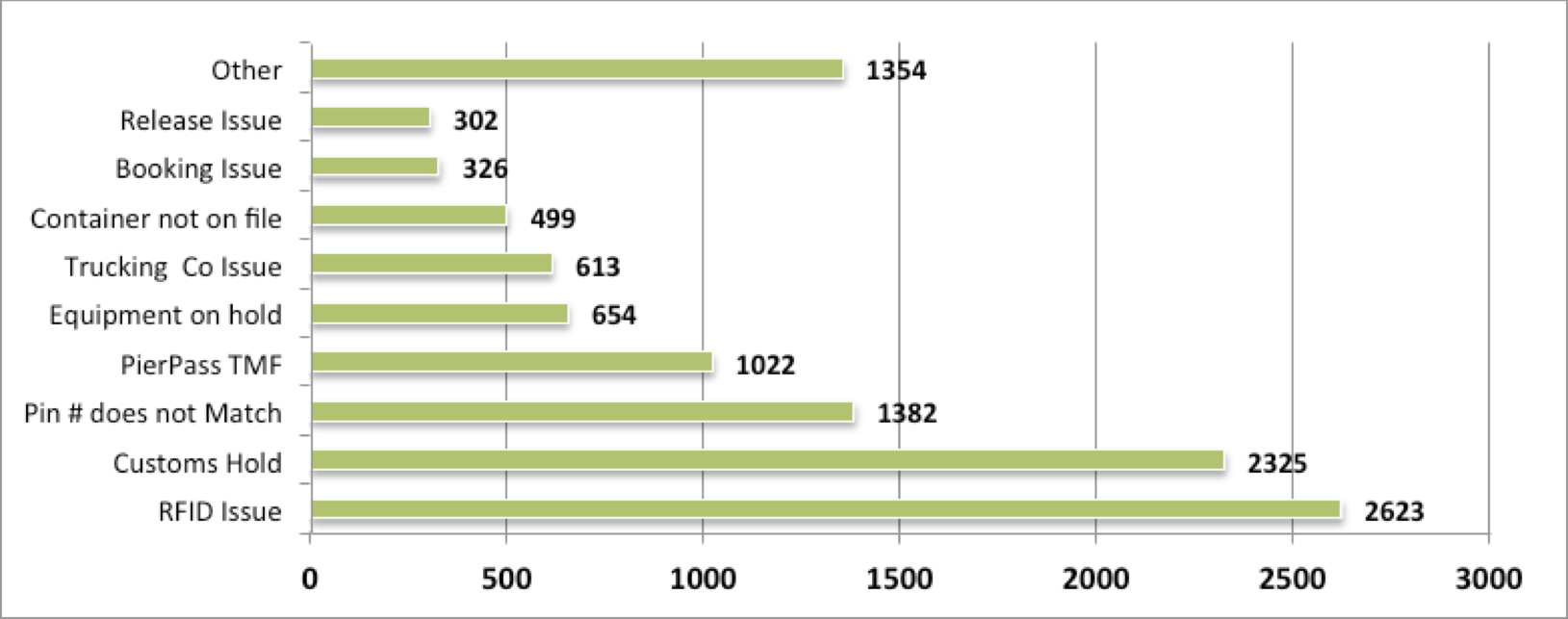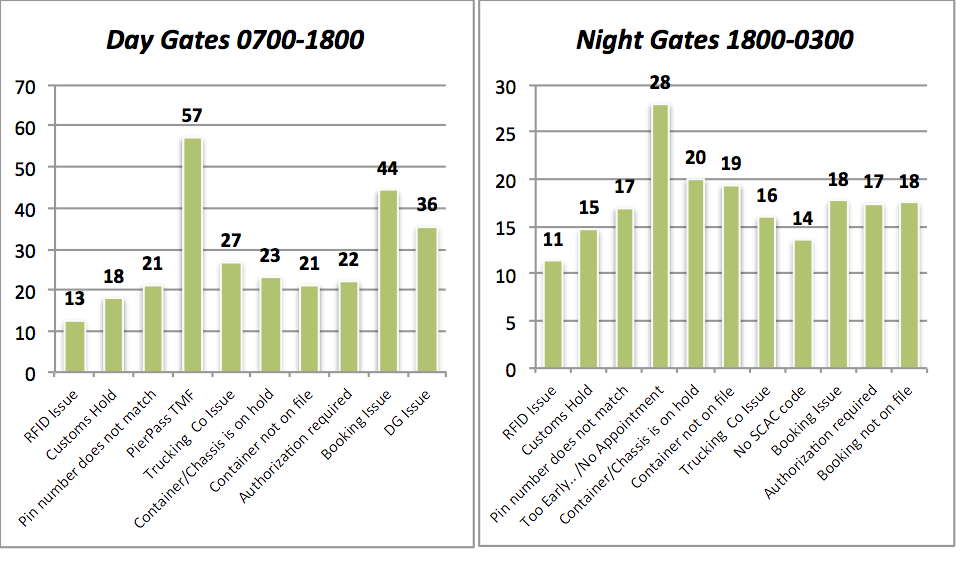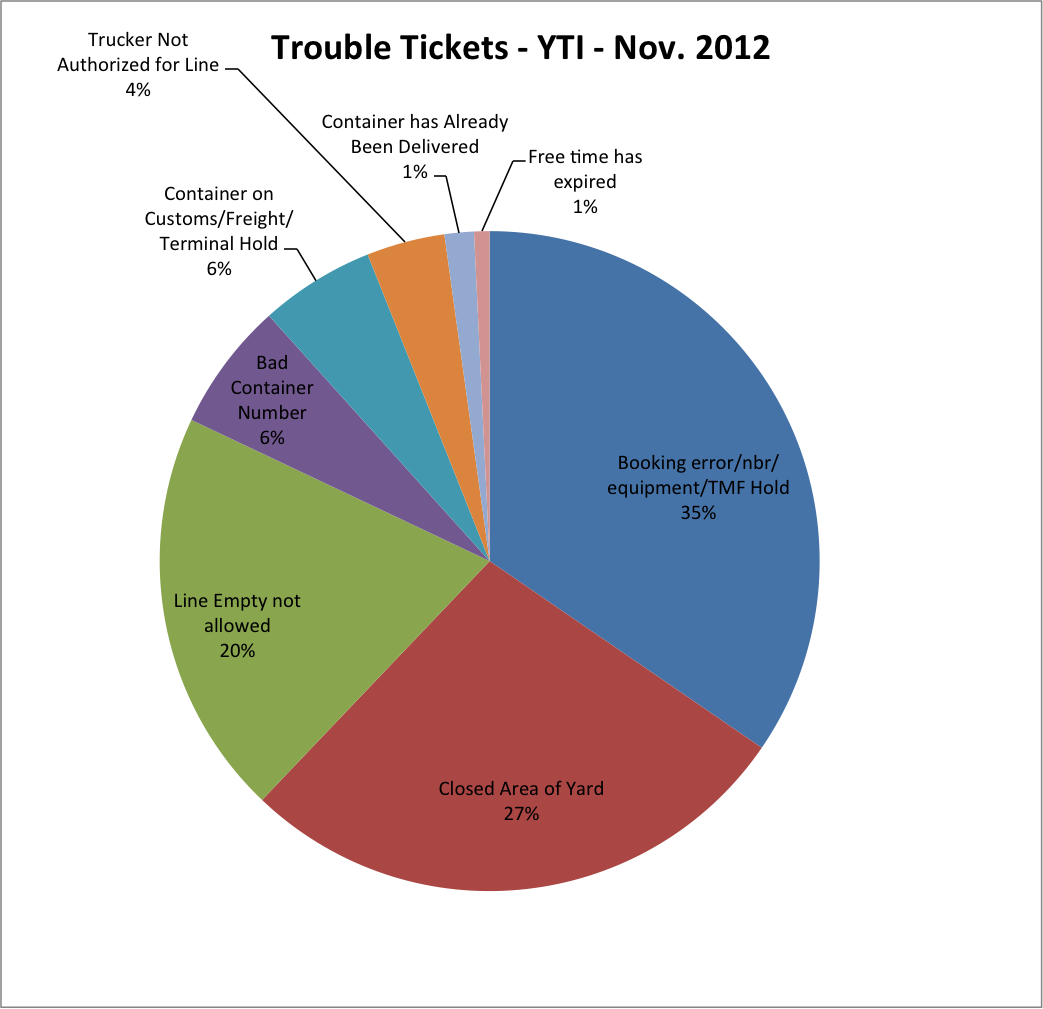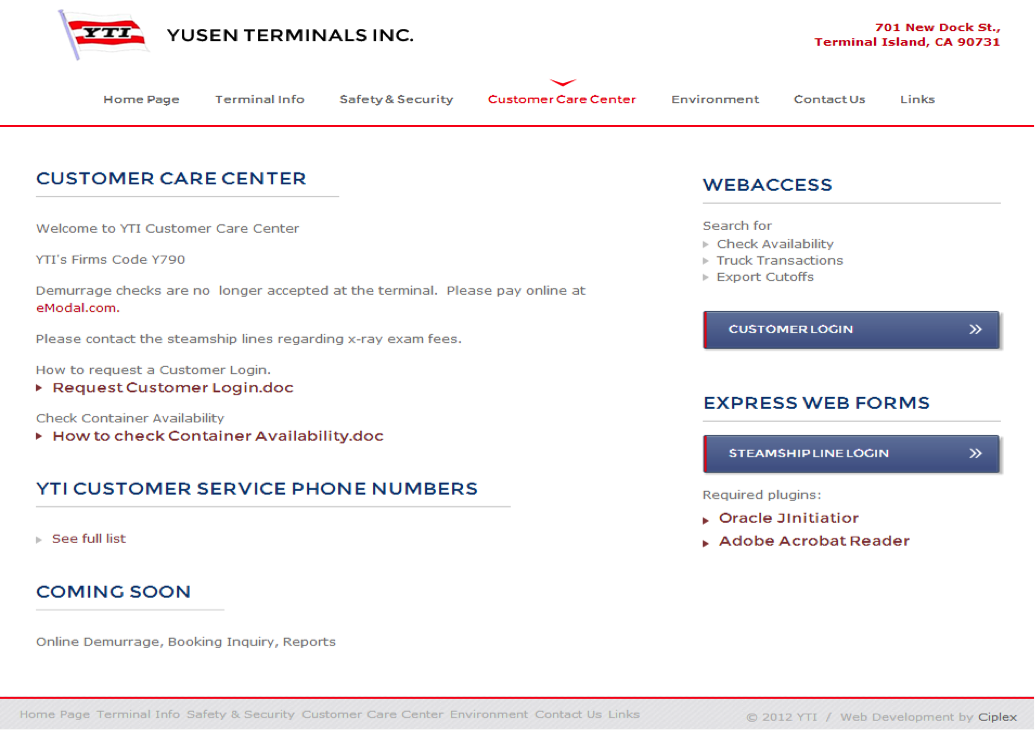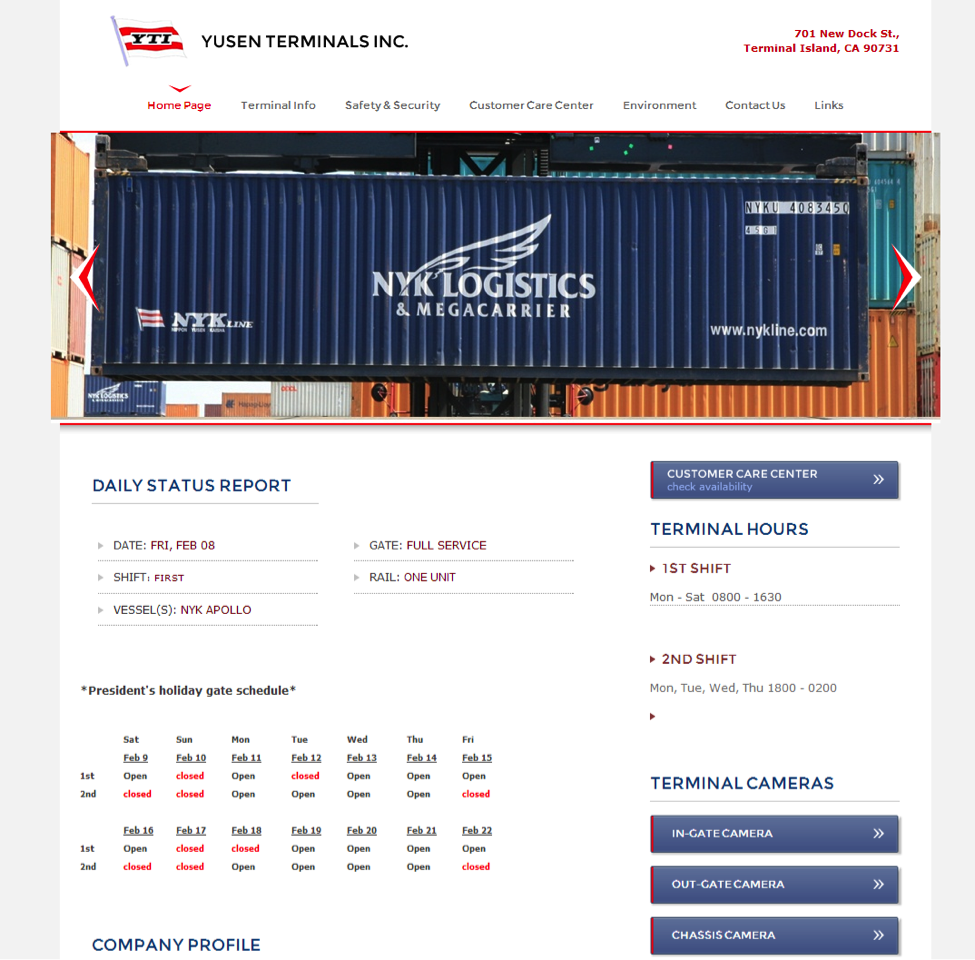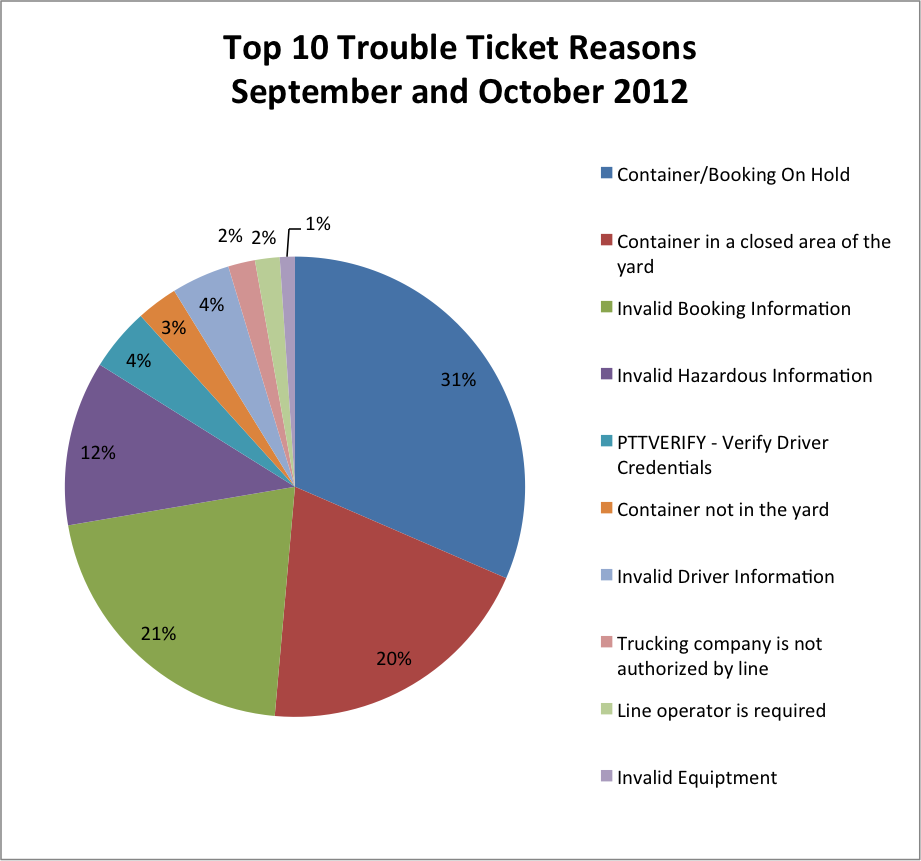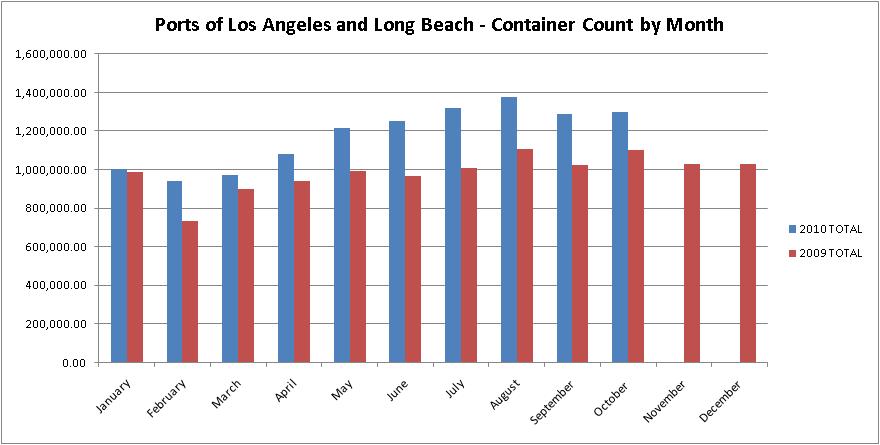As part of our continuing effort to better understand trouble tickets and their causes West Basin Container Terminal (WBCT) in the Port of Los Angeles has provided the fifth in our series of reports.
WBCT’s report is the first in our series to break out average delays caused by individual types of trouble tickets. During the day gates, the longest delays – an average of 57 minutes in January and February – are caused by dispatching drivers to move a container before the Traffic Mitigation Fee has been paid. During the night gates, arriving too early before the appointment time or the start of the night gates is the longest cause of delays, at an average of 27 minutes.
At WBCT, the largest generator of trouble tickets is truck registration information in their database. Interestingly, it is also the easiest and least time-consuming (11 minutes on average) to fix.
Like previous reports, many of the issues that generate a trouble ticket and additional truck delays can be avoided with some advance checking in the terminal computer system for import availability, booking number accuracy and TMF payment status.
In this month’s example (please see below), Jeff Boden details WBCT’s experience with trouble tickets for January and February of 2013 and provides tips on how to avoid them.
WBCT Trouble Transaction Observations
In an effort to improve our customers’ experience while on terminal we have been tracking the number and type of trouble transactions and the length of time needed to correct them. Through our observations we have noticed that the trucking community is preparing their drivers for the terminal more and more, but there is still room for improvement.
Your efforts to reduce the frequency of these problems have been noticed. During the last two months at WBCT, we have completed 133,305 gate moves, with only 5,932 going to the trouble window, or generating trouble tickets. That means only 4.45% of the drivers at our terminal had a trouble transaction to correct.
Frequency of Trouble Transactions by Cause
As you will see from our data below, the largest single cause of top trouble tickets issued at WBCT is trucks arriving with incorrectly registered RFID tags. Most of these troubles are from the truck not being registered for the company that the driver is reporting he is driving for. You can also see that this is the quickest trouble for us to resolve at only 11 minutes on average. This issue can be avoided entirely by ensuring that your drivers are correctly registered to your company with eModal before they enter the terminal.
Another major contributor at the trouble window is the customs hold. It is our procedure to have drivers come to the window with their paperwork to clear customs holds. While the number of trouble transactions due to this cannot be changed, the time spent at the window can certainly be reduced by checking your containers on our website www.voyagertrack.com ahead of time for these types of holds and sending your driver in with all necessary paperwork or fees due.
We also see heavy volume at the trouble window with drivers that do not have the correct Pin number for their transaction. This takes drivers an extra 17-21 minutes to get their container on average and accounts for as much as 16% of all trouble transactions. By making sure that drivers have the correct information, this number can be greatly reduced.
Breakdown of Trouble Transactions over January and February
Time Lost
Two unnecessary trouble tickets that have caused long wait times can be easily corrected. The first is arriving too early for the scheduled pick-up appointment time. Drivers should arrive at the terminal no earlier than one hour from their scheduled pick-up appointment time. This will allow them to complete any return moves and stage for the pick-up. Drivers arriving prior to one hour before their appointment will have to wait causing undue stand-by time. WBCT will process drivers in for PierPass pick-ups at 1700, and 1800 for Export PierPass returns. Drivers arriving prior to that time will be forced to wait outside the gates until those times. Please dispatch your drivers accordingly, as over the last two months we have seen average wait times at 28 minutes for imports and 57 minutes for exports due to the above mentioned troubles.
The second most time-consuming trouble ticket is issued to drivers with booking issues or trucking company issues. The booking issue could be anything from a full booking to the wrong size or type of container on a booking. The trucking company issues are most commonly that the trucking company is not registered with the steamship line or the trucking company has been put on hold by the steamship line. These issues can be avoided by regularly checking your booking, correctly dispatching drivers and making sure your company is currently registered and clear of any steamship line holds. Please confirm both of these items prior to dispatching drivers to the terminal.
Equipment holds are the third most time-consuming trouble ticket issued to drivers. Drivers arriving to pick up containers or chassis that are on hold will receive these unnecessary trouble tickets. Information pertaining to container and chassis availability is available on our website www.voyagertrack.com. The information provided is current and drivers should never be dispatched to pick up a container or chassis that is showing on hold without consent from the terminal.
Average Delays (in minutes) by Type of Trouble Transaction in January and February
Conclusion
By following our above recommendations, we believe that trouble tickets and wait times can be reduced by at least 30%. We also recommend familiarizing yourselves with Voyager Track Website (www.voyagertrack.com), which offers several tools our customers can utilize including appointment setting, container availability and payment options. We also encourage you to reach out to our customer service staff for assistance resolving or avoiding these issues if you can’t resolve the issue online. The customer service group can be reached via email at wbctcs@wbct.us and wbcttow@wbct.us.

